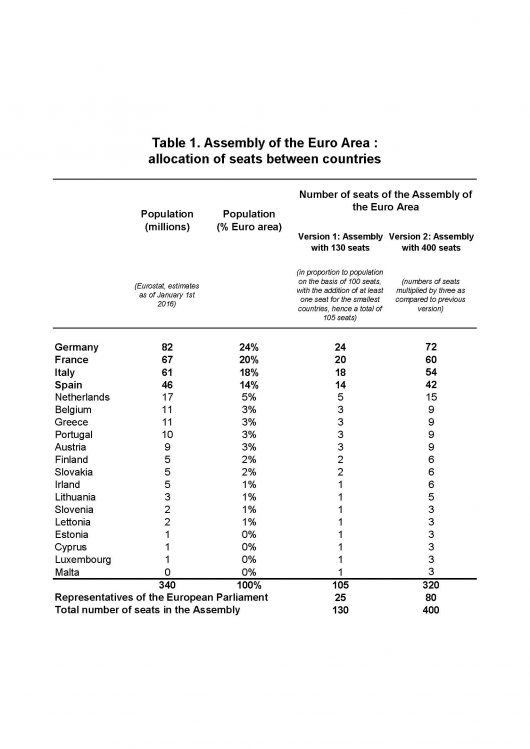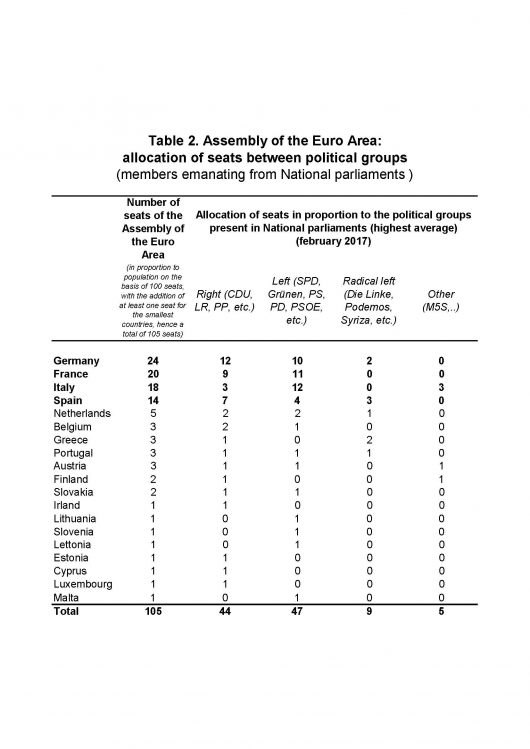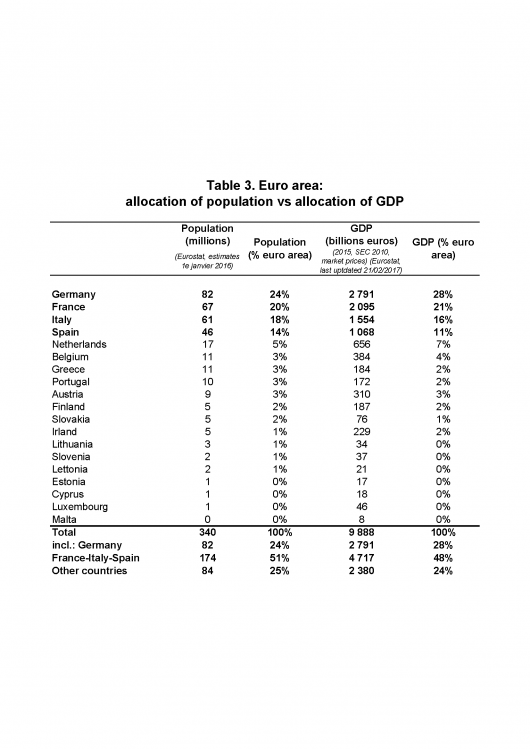Partager cet article What would the Euro Zone Assembly defended in Le Monde last week by Benoit Hamon look like? What would the political composition be and would it be in a position to « outvote austerity measures » or not? Would it allow to put in place a genuinely democratic euro-zone government? It should be pointed out straightaway that there is no miracle Parliament or perfect Treaty and that any change in the institutions cannot on its own reconcile Europe with its citizens. The project of a ‘Treaty for the democratization of the governance of the Euro Zone’ – (T-Dem), available on line here in French (and there in English) is simply an initial basis for discussion which would need to be debated at length and improved through proposals from all. This draft treaty has been prepared by recognized specialists in European Law – Stéphanie Hennette, professor of public law at Paris-Nanterre University and Guillaume Sacriste and Antoine Vauchez, professors and research fellows in political science at the Paris-I-Panthéon-Sorbonne University and in the CNRS (Centre National pour la Recherche Scientique). It does have the virtue of existing and demonstrating that there are solutions available to make Europe more democratic and more social, which do not involve the revision of all the existing treaties, and which are based solely on the countries which wish to move ahead.
Topics:
Thomas Piketty considers the following as important: in-english, Non classé
This could be interesting, too:
Thomas Piketty writes Regaining confidence in Europe
Thomas Piketty writes Trump, national-capitalism at bay
Thomas Piketty writes Democracy vs oligarchy, the fight of the century
Thomas Piketty writes For a new left-right cleavage
Partager cet article
What would the Euro Zone Assembly defended in Le Monde last week by Benoit Hamon look like? What would the political composition be and would it be in a position to « outvote austerity measures » or not? Would it allow to put in place a genuinely democratic euro-zone government?
It should be pointed out straightaway that there is no miracle Parliament or perfect Treaty and that any change in the institutions cannot on its own reconcile Europe with its citizens. The project of a ‘Treaty for the democratization of the governance of the Euro Zone’ – (T-Dem), available on line here in French (and there in English) is simply an initial basis for discussion which would need to be debated at length and improved through proposals from all.
This draft treaty has been prepared by recognized specialists in European Law – Stéphanie Hennette, professor of public law at Paris-Nanterre University and Guillaume Sacriste and Antoine Vauchez, professors and research fellows in political science at the Paris-I-Panthéon-Sorbonne University and in the CNRS (Centre National pour la Recherche Scientique). It does have the virtue of existing and demonstrating that there are solutions available to make Europe more democratic and more social, which do not involve the revision of all the existing treaties, and which are based solely on the countries which wish to move ahead. These include at the outset France, Germany, Italy and Spain; these four countries together represent 76% of the population and the GDP of the Euro Zone. This project for democratisation is in stark contrast to the somewhat vague proposals usually put forward by the political leaders and enables the discussion to be opened on a clearly structured basis. A short book presenting the projected treaty and explaining each article will be available in bookstores in a few days.
In real terms, what would the composition and the political orientation of the Euro Zone Parliamentary Assembly instituted by the Treaty for Democratization be? There are several possible scenarios, depending on whether we envisage a restricted Assembly (approximately 100 members) or a larger one (with a maximum of 400 members provided for in the T-Dem, article 4).
In the case of a restricted Assembly, if we take as a basis a total of 100 members from national parliaments, then Germany would send 24 members (because it represents 24% of the Euro Zone), France 20 members, Italy 18 members, Spain 14 and so on. To guarantee that each Member State has at least one seat (T-Dem, Art. 4) 5 extra seats will be required, hence a total of 105 members from national Parliaments. If we add 25 members from the European Parliament, the final total would be 130 members. 105 would come from national parliaments ((80%) and 25 from the European Parliament (20%) (as provided for in T-Dem, art. 4). The small size of this Assembly could mean improved efficiency in decision-making (see Table 0).

In contrast, an enlarged Assembly would make it possible to take political plurality more fully into account, in particular for the smaller countries, which could obtain a minimum of three members. We would thus have an Assembly of 400 members, of which 320 would come from national parliaments and 80 from the European Parliament (see Table 1).

It is also possible to consider the composition which a Euro Zone Assembly might have in left-wing, right-wing political terms. Of course, this is rather artificial given that the ‘right’, ‘left’ and ‘radical left’ political groupings which are presented in Table 2 (see below) all exist but the frontiers change from country to country and they frequently have difficulty in surviving as such within the European institutions. Our speculations do however show political regroupings and potential majorities, thus revealing the possible shape of a genuinely transnational politics. This highlights what a transnational parliamentary socialisation around partisan identities and political divisions might possibly lead to, and the manner in which national lefts and rights might find themselves redefined in this Assembly. This would in particular be the case if this Assembly were to effectively exercise powers (as is provided for by the T-Dem, in particular with the voting of the Euro Zone budget and of a common tax on corporate profits contributing to this budget, see Articles 12 to 15) and not be reduced to rubber stamping policies.
Whatever the solution adopted, it must be stressed that the composition of the Parliamentary Assembly could lean distinctly to the left, at least in the present state of the political groups in the various national Parliaments (March 2017). For example, in the example of the restricted Assembly, the 105 members from national Parliaments would be divided into 44 from the right and centre-right (CDU/CSU, LR, PP, etc.), 47 from the left and the ecologists (SPD, Grünen, PS, PD, PSOE, etc.), 9 from the so-called Radical Left (Die Linke, Podemos, Syriza, etc.) and 5 who are unclassified (Five Star Movement, etc.) (see Table 2). Taking into account the 25 members from the European Parliament, in proportion to the various groups, only makes marginal changes to this balance (detailed data is available below).

It is also important to remember that on questions of budgetary policy, the re-launching of the European economy, the restructuring of the debt etc., the positions of the French, Spanish or Italian right wing are frequently quite significantly different from the German right, which only has 12 seats (of the 105 members from national parliaments) in the Euro Zone Parliamentary Assembly.
To recap: the Euro Zone Parliamentary Assembly is not a cure-all. Our proposal of a Treaty for democratization can and must be improved and completed and we in no way claim that the decisions which will be taken by this Assembly will always be in keeping with our desires or will enable the resolution as if by magic of all the problems of Europe. But it does seem to us reasonable to state that this Parliamentary Assembly would provide a democratic framework which would enable austerity to be out-voted, or at least to very substantially modify the present balance of power and to finally ensure that a rationale of public, pluralist and democratic debate will prevail over the cult of diplomacy behind closed doors and opaque decision-making. Ask everyone – and in particular, Jean-Luc Mélenchon, Emmanuel Macron and François Fillon – to say how they propose to amend and modify this proposal for the composition of the Parliamentary Assembly, or whether they intend to govern the Euro Zone permanently without a Parliamentary Assembly and to stick to the present inter-governmental status quo.
Finally: it may be worthwhile stressing that the results would not be very different if we distributed the seats in proportion to the gross domestic product (GDP) of the various countries, and to their populations. This type of electoral system, which would amount to applying a rule of ‘one Euro, one vote’ between countries (a system which moreover currently exists for the voting in the Council of Governors of the ESM as well as in the ECB for the votes relative to the restructuring of its capital) would obviously be less satisfactory from a democratic point of view, and in our opinion, totally inacceptable (why not extend it to the regions and between individuals?). But the fact is that it would lead to results that would not be very different for the composition of the Parliamentary Assembly, quite simply because the GDP per capita is actually fairly similar in the Euro zone countries. In real terms, Germany represents 24% of the population of the Euro Zone, as compared with 51% for France, Italy and Spain and 25% for the other countries. As a proportion of the GDP, the distribution is 28% for Germany, 48% for France, Italy and Spain, and 24% for the other countries. In other words, if we applied this distribution key, the number of seats allocated to Germany would rise slightly but the political balance would be only marginally affected: for example the German right would have 14 seats instead of 12 (of the 105 members from the National Parliaments).

Now let’s deal with the difficult question: what happens if some of our partners refuse to discuss the Treaty for the democratization of the Euro Zone? Let’s take a textbook case: what happens if the German political decision-makers, frightened that they might be outvoted in democratic Euro Zone parliamentary Assembly, close the door on any negotiation? We can suggest three sets of answers to this question.
In the first instance, even in the bleakest assumption in which some of our partners were to refuse any discussion, we believe it is essential to put a possible alternative on the table. To date, the French political leaders have never proposed a genuine project for parliamentary and political union to their partners in the Euro zone. France regularly complains about Brussels, Germany and sometimes the whole world but we have rarely seen her make a public and specific suggestion enabling the implementation of a more democratic and social Europe. Even in the bleakest hypothesis in which these proposals would be purely and simply rejected by our partners, this stage of proposal and explanation of disagreements seems to me to be fundamental from a political and historical standpoint. If France were to publicly propose a parliamentary democracy to the Euro zone and to Germany, on a basis of one man, one vote, and Germany were to stubbornly refuse any discussion of such a proposal, then it is probable that the outcome would be a climate of suspicion and exasperation which would ultimately destroy the Euro zone. It is probable that other votes, in other elections in France or elsewhere, would lead to other countries leaving and an explosion of the European project. But even in this extremely pessimistic scenario, I consider it is crucially important that a plausible democratic alternative first be explicitly debated.
Secondly, this extremely pessimistic scenario does not seem to me to be the most realistic – far from it. Our partners, especially our German partners, are at least as attached as we are to the values of parliamentary democracy, and are often much more advanced in their thinking about political union. In addition to the fact that political power might very well change hands and swing to the left in the near future in Germany, there are a very considerable number of German citizens and political decision-makers, including of course on the right, who would very warmly welcome a French proposal for a Euro zone parliamentary union. At the very least, there is not the slightest doubt that a negotiation would open and a compromise could be found, the nature of which nobody can foretell. The pressure of peoples and opinions, in particular in Italy and in Spain is pushing towards the democratization of Europe.
Thirdly, the T-Dem project itself, in its conditions for ratification (Art.20) provides for a possible way out of the crisis. If 10 countries out of the 19 in the Euro zone, representing at least 70% of the population, ratify the T-Dem, this is sufficient for it to enter into force. In absolute terms, it is possible to envisage the entry into force without one of the major countries, for example without Germany. This path does not seem desirable nor is it the most likely – far from it. But there is at least a path enabling countries which so desire to show their good willing, by launching a process of partial ratification, which would enable increased pressure to be put on the countries which might refuse any discussion. The issue at stake today is not to fix deadlines beyond which countries would start to play Brexit. The issue is one of taking specific actions to show that there is a democratic path leading out of the contradictions in which our continent is ensnared at the moment.
(The detailed data tables on National parliaments used to construct the above tables were collected with the help of Manon Bouju and are available here in xls format)
